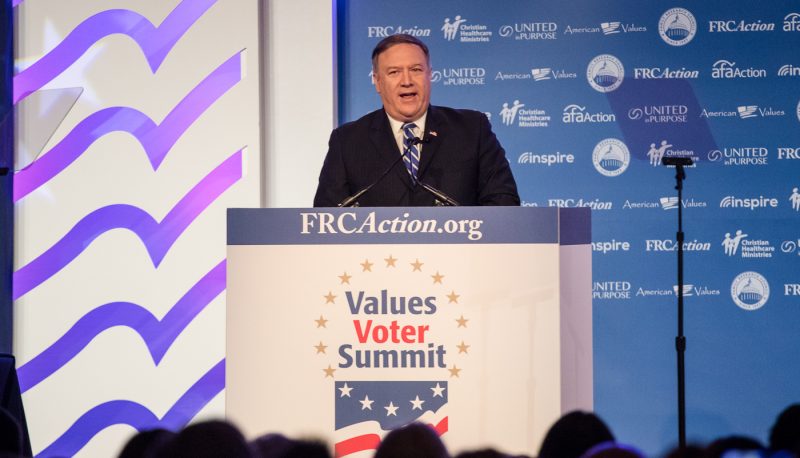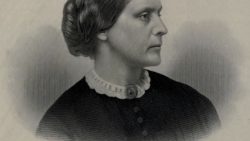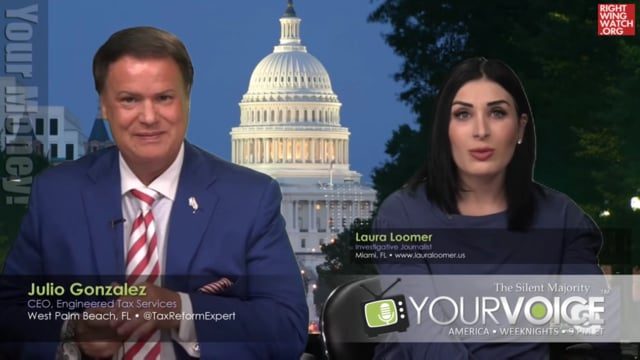U.S. Secretary of State Mike Pompeo formally announced the formation of a new Commission on Unalienable Rights, which will bypass the State Department’s existing human rights infrastructure and bring a “natural law” lens to examining U.S. human rights policy. Religious Right activists cheered while human rights advocates warned that the commission could lead to a narrowing in U.S. support for human rights, including U.S. support for legal equality for LGBTQ people.
“This administration has actively worked to deny and take away longstanding human rights protections since Trump’s inauguration,” said Joanne Lin, national director of advocacy and government affairs for Amnesty International USA. “If this administration truly wanted to support people’s rights, it would use the global framework already in place.” The Trump administration has withdrawn the U.S. from the United Nations Human Rights Council.
News of the planned commission emerged several weeks ago, when it was reported that anti-LGBTQ activist, Princeton University scholar and conservative Catholic Robert George had “played a prominent role in the creation of the commission” and was being considered to chair it. George’s prominence as an anti-equality activist alarmed Democrats and gay-rights advocates. George opposes civil unions as well as marriage equality and has declared that “it is critical” that law and policy “avoid treating nonmarital conduct and relationships as if they were marital.” George represented the Family Research Council and Focus on the Family in their amicus brief in Lawrence v. Texas, which argued that the state should be allowed to treat consensual sex between same-sex couples as criminal while not punishing unmarried heterosexual couples for the same activity.
Last fall, while helping launch a new Center for the Study of Human Rights at Catholic University, George warned about the “inflation” of human rights. “People will try to win at ideological battles, advance their agendas whatever they are, with the language of human rights,” he said. “So they’ll inflate claims, whatever they desire, and treat it not as a desire, a want, a feeling, a passion, but a human right.” Added George, “We lose our sense of the power and importance of the fundamental rights because of the inflation that happens when you conflate whatever it is you desire, whatever is on your agenda, with rights,” George said.
Pompeo advanced this theory in his remarks on Monday and in a Wall Street Journal op-ed in which he said, “A moral foreign policy should be grounded” in the American founders’ conception of unalienable rights. “Yet after the Cold War ended, many human-rights advocates turned their energy to new categories of rights,” Pompeo wrote. “These rights often sound noble and just. But when politicians and bureaucrats create new rights, they blur the distinction between unalienable rights and ad hoc rights.” Pompeo writes that “rights claims” often aim at “rewarding interest groups and dividing humanity into subgroups.” He wrote, “Human-rights advocacy has lost its bearings and become more of an industry than a moral compass.”
George’s name was not among the members Pompeo announced on Monday, though he has been affiliated with some of them. In place of George, the new commission will be chaired by Mary Ann Glendon, a Harvard University law professor who serves with George on the on the advisory council for Catholic University’s human rights program.
Glendon has also warned that human rights advocacy is “a victim of its own success.” More specifically, she told the Catholic publication Crux last year that she worried that religious freedom risks “becoming a second-class right that is regularly, or too often, subordinated to a whole range of other rights, claims and interests.”
Glendon, a former U.S. ambassador to the Holy See, has also helped promote the Religious Right’s portrayal of U.S. and European advocacy for the human rights of LGBTQ people as “neocolonialism.” She complained to Crux about “Western-funded human rights organizations” she said “are coming in and claiming universal human rights status for their agenda, treating people in those countries as if they are ignorant and they better get with the human rights program.”
Glendon is a board member of Becket, formerly known as The Becket Fund, which represented Hobby Lobby in its successful effort to get conservative Supreme Court justices to declare that a for-profit corporation could claim exemption from generally applicable laws based on the religious beliefs of company owners.
Glendon is also an ardent foe of abortion rights. Last year she accepted an award from the University of Notre Dame’s Center for Ethics and Culture for her anti-choice activism. She had refused to accept the Laetare Medal from Notre Dame in 2009 because the university had granted an honorary doctorate to President Barack Obama.
As noted by Tim O’Donnell in The Week, Glendon was critical of the Boston Globe’s groundbreaking investigations into the extensive sexual abuse carried out and covered up by clergy and bishops in the Catholic Church, saying that “if fairness and accuracy have anything to do with it, awarding the Pulitzer to the Boston Globe would be like giving the Nobel Peace Prize to Osama bin Laden.”
The charter for Pompeo and Glendon’s new commission says it “provides fresh thinking about human rights and proposes reforms of human rights discourse where it has departed from our nation’s founding principles of natural law and natural rights, to which Lincoln called us at Gettysburg and to which King called us while standing in front of the Lincoln Memorial on the Mall in Washington, D.C.”
Yale law professor Harold Hongju Koh, assistant secretary of state for human rights under President Clinton, told the New York Times that shifting U.S. human rights policy to a “natural law” focus “would conflict with the view that ‘modern human rights are based on the dignity inherent in all human beings, not on God-given rights.’”
New Ways Ministry’s Bob Shine has noted that Justices John Roberts and Antonin Scalia “relied upon natural law arguments for their dissents to the Obergefell decision” recognizing the right of same-sex couples to marry. “Natural law theory has been used for a long time by Catholic Church leaders and theologians who reject LGBT people’s identities and their relationships,” Shine wrote. Pope Paul VI’s 1968 Humanae Vitae encyclical “relied on so-called natural law arguments to defend the church’s ban on contraception,” Gonzaga University professor Patrick McCormick noted several years ago.
Daniel Morris of Augustana College has called “natural law accounts of human sexuality” the “last holdout against marriage equality” and “the last voice against the full dignity of people who do not conform to heteronormative social standards.” One example is George protégé Ryan Anderson, the Heritage Foundation’s relentless opponent of the LGBTQ equality movement; earlier this year Anderson organized a conference on “Natural Law and Gender Ideology” at Fransciscan University of Steubenville.
Anti-LGBTQ equality and anti-choice activists at the World Congress of Families and its parent organization, the International Organization for the Family, frequently use language defending the “natural family” as a “natural union” of a man and a woman. At the World Congress of Families global summit in Tbilisi, Georgia, in 2016, German sociologist Gabriele Kuby attacked what she called “cultural revolutionists” at the United Nations and European Union; she warned that “gender theory”—which she called “crazy,” “delusional,” and “totalitarian”—was finding its way into international law through the door of human rights and antidiscrimination law.
It is troubling to many human rights advocates that Pompeo has embraced George’s initiative to bypass normal State Department human rights structures; there is good reason to imagine that the real goal of the commission is to provide an intellectual justification for the U.S. to further abandon international advocacy for sexual and reproductive rights and health and protection against discrimination on the basis of sexual orientation and gender identity—a goal pursued intensively by U.S. Religious Right groups who have happily teamed up with the world’s biggest violators of religious freedom in order to keep recognition of LGBTQ rights out of international agreements and defend the right of countries to enforce “traditional” ideas about gender, sexuality, and family.
Pompeo has pledged that the commission will be diverse and bipartisan. In addition to Glendon, the members of the commission announced by Pompeo on Monday include:
- Russell Berman, a Stanford University humanities professor and Hoover Institution senior fellow.
- Peter Berkowitz, a political scientist, is also a Hoover Institution senior fellow and member of the Policy Advisory Board of the Ethics and Public Policy Center. He is also a member of the board of directors of the National Association of Scholars, where George sits on the board of advisors.
- Paolo Carozza, a Notre Dame law professor, former director of its Center for Civil and Human Rights and a former member of the Inter-American Commission on Human Rights.
- Hamza Yusuf Hanson, a prominent American-born convert to and scholar of Islam
- Jacqueline Rivers, an African American anti-abortion activist and director of the Seymour Institute on Black Church and Policy Studies; in 2017 she participated in a panel about “overcoming intolerance and conformism in academia” that has moderated by George and sponsored by his James Madison Program at Princeton
- Meir Soloveichik, an Orthodox Rabbi and author with a PhD from Princeton who gave an opening prayer at the 2012 Republican National Convention
- Katrina Lantos Swett, president of the Lantos Foundation for Human Rights and Justice and former chair of the U.S. Commission on International Freedom
- Christopher Tollefsen, a philosophy professor at the University of South Carolina and co-author with Robert George of a book grounded in the natural law philosophy they share; he contributes to Public Discourse, the Witherspoon Institute journal founded and edited by Ryan Anderson
- David Tse-Chien Pan, a University of California Irvine School of Humanities German professor









